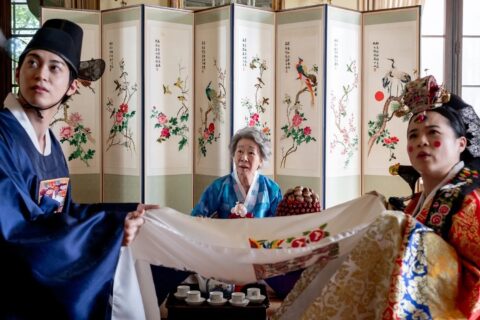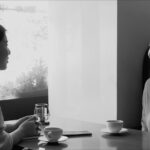Right from the beginning, The Wedding Banquet (Andrew Ahn) makes its queer credentials clear. It begins at a PFLAG (Parents and Friends of Lesbians and Gays) meeting, where May Chen (Joan Chen) talks about supporting her daughter Angela (Kelly Marie Tran), who is currently trying for a baby with Lee (Lily Gladstone). Their issues with fertility are twinned with the on-off relationship between the Korean Chaebol1Huge Korean family business-inheriting Min (Han Gi-Chan) and the marriage-phobic Chinese-American Chris (Bowen Yang), who is worried that Min’s grandmother Ja Young (Youn Yuh-jung) will cut him off and yank him back to Korea if he was to ever properly come out. The solution: Min will fake his marriage to Angela. The problem: Ja Young wants to fly over and conduct a proper ceremony.
This “comedy” is a remake of Ang Lee’s 1993 film of the same name. While that had its own set of problems — including an incredibly misguided post-wedding sequence that threatened to destroy the meaning of the film entirely — it not only benefited from the gorgeous lensing of Jong Lin, bringing 90s New York to life, but a deep and sustained interest in the specifities of Taiwanese-American life as well as the clash between a modern yuppie lifestyle and the pressures of a conservative family. Andrew Ahn leans far more into the inclusive potential of the storyline, focussing on the idea of a found family and the different challenges facing lesbians and gays, but in the process eliminates any real exploration of Asian-American culture as well as the very real difference between people of Chinese descent and Korean immigrants.
I simply don’t believe that when Min announces his marriage to a Chinese-American woman, the fact that she is not Korean wouldn’t be commented upon in some capacity. It’s not that I would expect the Korean family to be distrustful towards her, but the complete flattening of any cultural difference — lumping both people into the same generic “Asianness” — feels both stupid and a massive wasted opportunity. This makes Crazy Rich Asians (Jon M. Chu, 2018) feel like a Zhang Yimou film.
I think back to the rich comic world of Anora (Sean Baker, 2024) and its conflict not only between Russians and Americans, but also Russians and Armenians, bound by their Soviet past and a shared language, but filled with fascinating — and often deeply humorous — difference. Of course, many cultural references will be lost on audiences, but there is a way to make this type of film without making it as boring and as bland as humanly possible.2 Anora, as it happens, won Best Picture! In fact, the only thing we really learn about Korea (beyond a short wedding ceremony [above], nothing about its food, music or culture appears) is that it’s really homophobic. Great.
The film’s startling lack of interest in cultural specificity culminates in a deeply frustrating scene when the Korean Youn Yuh-jung and the Chinese-American Joan Chen — both legendary actresses in their own right — sit down together alone to eat the wedding leftovers and drink some soju (or is it? We are never told). This might be an opportunity for the two women, bound by their Asianness but separated by nation and a variety of lived experiences, to bond in a way that reflects their different cultural backgrounds. What are they eating? What do they think about America? What was interesting about a Korean wedding? We will never know. Ahn squanders this with generic wedding chat, uninterested in anything beyond the absolute soapiest drama possible.
These soapy elements, piling confrontation after confrontation on top of each other, everything laced in the most progressive therapy-speak possible, make for an unbearably sentimental experience. Besides the “whatever works” structure that you can predict from a mile away, and characters just saying “that’s gay” over and over (is that funny?), there’s barely any comedy to be found. Additionally, Seattle, besides being generically gay-friendly, hardly makes an appearance besides some half-hearted second unit photography, resulting in a film that could’ve been about just about any culture, anywhere. The problem is, the more generic you make a movie, the less universal it feels. There’s nothing to feast on here.

Redmond is the editor-in-chief of Journey Into Cinema.




